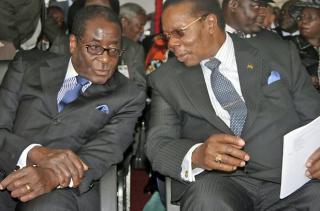On Malawi’s loan to Zimbabwe
Published on December 15, 2011 at 8:43 AM by FACE OF MALAWI
 Malawians continue to labour under a heavy burden of grave political and socioeconomic deprivation. Needless to mention, the Executive arrogance, erratic fuel supply, scarcity of forex, dry water taps, and incessant electricity failure, just to mention a few, characterize the contemporary Malawi.
Malawians continue to labour under a heavy burden of grave political and socioeconomic deprivation. Needless to mention, the Executive arrogance, erratic fuel supply, scarcity of forex, dry water taps, and incessant electricity failure, just to mention a few, characterize the contemporary Malawi.
But while a good number of ordinary citizens understand that solutions to the country’s problems lie right within our borders, political intolerance by the ruling regime continues to suffocate constructive views from large quarters of the Malawian society.
Paradoxically, there is no apparent urgency and ample willingness on the part of Government to swiftly address mounting political and socioeconomic concerns. Instead, there is an evidently high spending indiscipline among the country’s top brass amid the prevailing economic shocks. Moreover, Government does not seem to realize that its frequent outbursts and defense of its mistakes, particularly through MBC TV reveals its profound negligence on socioeconomic needs of the people.
[malai-mugabe]
Comrades-in arms: President Mutharika and Mugabe
On top of the July 20 petition which Civil Society leaders presented to the country’s leadership, there are still numerous other compelling issues which Government needs to explain. One of such issues includes the raison d’être behind its guaranteeing of a June 2007 loan of circa $20 million which the Reserve Bank of Malawi granted Zimbabwe and was supposed to be fully repaid by December 2009.
In humanitarian terms, there shouldn’t be national bickering over such a “charity” gesture. In the first place, bilateral relations between Malawi and Zimbabwe are built upon historically rooted socio-cultural, economic and political ties solidified during the colonial era with the influx of Malawian labour migrants to Zimbabwe’s agricultural and domestic sectors.
The establishment of the Federation of Rhodesia and Nyasaland strengthened relations further through bilateral trade and economic arrangements as well as commercial links between corporate groups from both countries.
It is probably in this light that leaders of both countries acknowledge the strength of inter-state relations between their countries. President Mugabe once claimed that “Malawi is [his] second home” since he has been “associated with [its] leadership for 45 years.”
Similarly, President Mutharika openly “assured [President Mugabe] and the people of Zimbabwe that Malawi will stand by [Zimbabwe] and will provide its support in all international and regional issues.”
Further to this, international relations are stimulated by possible benefits of interdependence. In other words, national leaders realize that just as good neighbourly relations in the traditional African sense constitute a crucial platform for a neighbourhood’s socio-cultural growth, their quest for people’s socio-economic wellbeing should equally trail the same reasoning.
Moreover, it is not the first time Malawi extended a helping hand to a neighbour. One can remember that in 2007 Malawi donated maize to the hunger stricken Lesotho, Swaziland and Zimbabwe.
However, it is important to understand that a foreign policy of a state reflects its national interests. In principle, a government’s foreign intervention does not signify charity. It only does so where it expects (although not necessarily a direct) reciprocity or at least a convergence of interests.
This explains why Malawi does not maintain diplomatic relations with Chad or Afghanistan, for example, as these countries may not present Malawi with its most sought socioeconomic development opportunities.
While Zimbabwe is crucially significant for Malawi in many respects including for example providing the country with a short and easy access to the region’s economic hub, South Africa, and accommodating thousands of Malawians the majority of whom have established themselves in that country, the political and economic mess Zimbabwe has been swimming in since the late 1990s falsifies the sincerity of the loan deal given the heftiness of the money and the scheduled repayment timeframe. Government’s policy shortsightedness in this regard exposes its lack of commitment, care, and transparency to its people.
Even if Malawi were not in the current economic turmoil, the country’s financial muscle is too weak to be used for ‘charity’. Government is supposed to use meager resources the country has to complement its longstanding quest for socioeconomic development. Who knows that the heavy taxing on certain significant commodities and services associated with the zero deficit budget could have been reduced if this money wasn’t given away?


